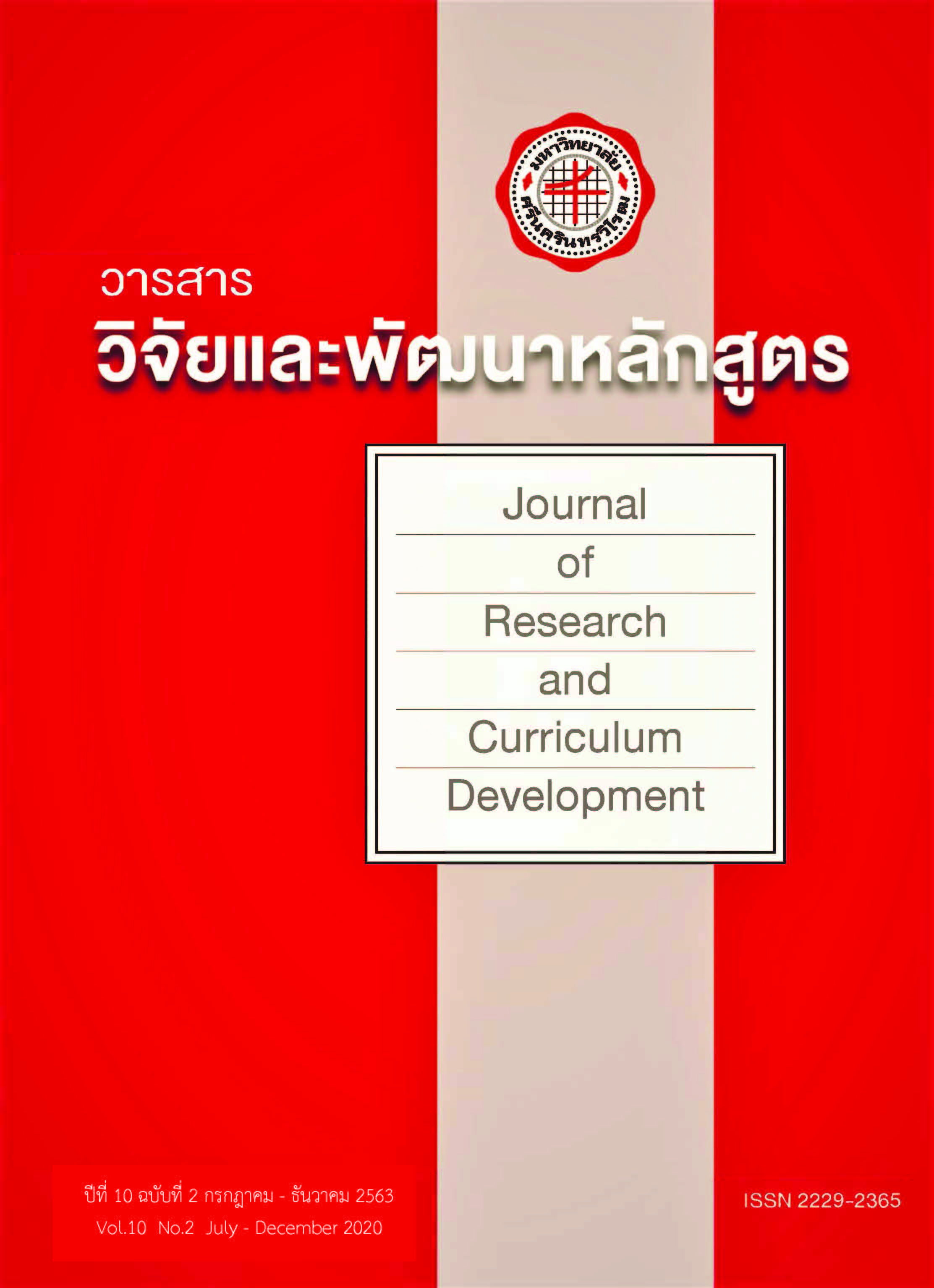การพัฒนาหลักสูตรเสริมสร้างศาสตร์และศิลป์การจัดการเรียนรู้ยุคดิจิทัลของครูระดับมัธยมศึกษา เพื่อส่งเสริมความสามารถของนักเรียนในการสร้างสรรค์ผลงานโดยใช้เทคโนโลยี
Keywords:
The Development of Curriculum, Science and art in Digital Age, Createive work using technologyAbstract
The purpose of this research were : 1) To develop and efficiency way of strengthening curriculum the science and art of learning digital age for secondary school teachers to encourage the students for learning and creating their work by using technology, 2) To evaluate the effectiveness of strengthening curriculum the art and science of digital learning for secondary school teachers to encourage the students for learning creation their work by using technology and 3) To expand the curriculum to strengthen the science and art of digital learning for secondary school teachers. The sample used in this study were secondary school teachers, 8 groups of 17 people and 28 twelfth graders during the second semester of the academic year 2019 at Joseph Upatham School.
The instruments used for gathering data were the curriculum and curriculum manual. The manual was used to access their ability to used technology in the classroom.
The data analysis by the mean ( ), the standard deviation (S.D.) and the content analysis. The results this study were : 1. The model for the developing of curriculum to enhance science and art, digital learning management for secondary school teachers to encourage the students for learning and creation their work by using technology is called "4C Model" This process is broken down into four parts : (1) Concepting the Curriculum Framework (2) Constructing the Curriculum (3) Creating the Learning Management (4) Checking Curriculum. This theory consists of 30 hours of training focusing on three units; (1) learning TPACK (2) Active Learning, (3) Teaching Style which 2. The effectiveness of curriculum found that: 2.1) The secondary school teachers who used this curriculum have a higher development in science and art, and digital management learning. 2.2) The secondary school students can create their work by using technology at a higher level. 3. The teachers participating in the curriculum to enhance the use of technology in the classroom were more effective and their students performed higher in the ability to create work using technology.
References
สารสนเทศและการสื่อสาร.
จินตวีร์ คล้ายสังข์. (2560). การผลิตและใช้สื่ออย่างเป็นระบบเพื่อการเรียนรู้ในศตวรรษที่ 21. กรุงเทพมหานคร : โรงพิมพ์แห่งจุฬาลงกรณ์
มหาวิทยาลัย
พิณสุดา สิริรังธศรี. (2557). การยกระดับคุณภาพครูไทยในศตวรรษที่ 21. กรุงเทพมหานคร : มาตาการพิมพ์.
มารุต พัฒผล. (2558). การประเมินหลักสูตรเพื่อการเรียนรู้และพัฒนา. พิมพ์ครั้งที่ 3. กรุงเทพมหานคร : จรัญสนิทวงศ์การพิมพ์.
ยืน ภู่วรวรรณ. (2558). “นวัตกรรมการเรียนการสอนกับการศึกษาระบบ 4.0” เทคโนโลยีสุรนารี 9, 2 (ธันวาคม): 133-156.
วิจารณ์ พานิช. (2555). วิถีการสร้างการเรียนรู้เพื่อศิษย์ในศตวรรษที่ 21. กรุงเทพมหานคร : มูลนิธิสดศรี - สฤษดิ์วงศ์.
วิจารณ์ พานิช. (2560). ศาสตร์และศิลป์ของการสอน. กรุงเทพมหานคร : ภาพพิมพ์.
สุเทพ ธรรมะตระกูล. (2555). การศึกษาคุณลักษณะของครูยุคใหม่. เพชรบูรณ์ : คณะครุศาสตร์ มหาวิทยาลัยราชภัฏเพชรบูรณ์.
สำนักงานเลขาธิการสภาการศึกษา. (2553). รายงานการวิจัย สมรรถนะครูและแนวทางการพัฒนาครูใน สังคมที่เปลี่ยนแปลง.
กรุงเทพมหานคร : พริกหวานกราฟฟิค.
Creswell, John W. and Vicki L. Plano Clark. (2011). Designing and Conducting Mixed methods Research.
2nd ed. California, Sage Publication, Inc.
Marzano, Robert J. (2007). The Art and science of teaching : a comprehensive framework for effective
instruction. Alexandria Virginia : ASCD.
Mishra, P., & Koehler, M. (2008). Introducing technological pedagogical content knowledge.Retrieved Jan 10,
2011, from http://punya.educ.msu.edu/presentations/AERA2008/MishraKoehler_AERA2008.pdf
Taba, H. (1962). Curriculum development: theory and practice. New York : Harcourt, Brace & World, Inc.
Tyler, R. W. (1969). Basic Principles of Curriculum and Instruction. Chicago: The University of Chicago.





